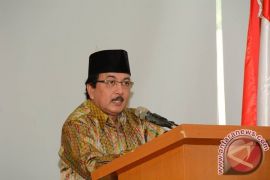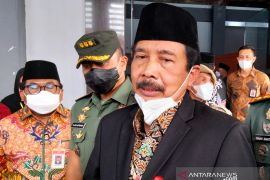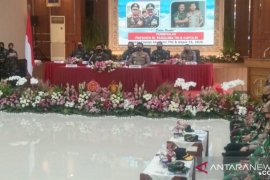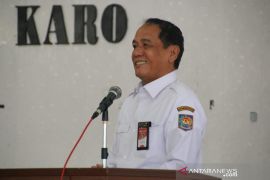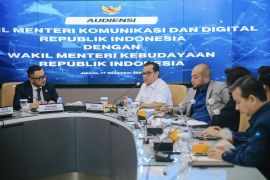"People are allowed to have religious concepts because it is respected, but when it contradicts or even threatens the nation`s and state`s principles, then the government should take action," Minister of Religious Affairs Lukman Hakim Saifudin said.Jakarta (ANTARA News) - The Indonesian government, through the Ministry of Law and Human Rights, finally has revoked the legal status of major Muslim organization Hizbut Tahrir Indonesia (HTI) for activities allegedly against the state ideology Pancasila.
The legal status of the HTI was revoked after President Joko Widodo (Jokowi) issued a Government Regulation in Lieu of Law (Perppu) No. 2 Year of 2017 on amendment of Law No. 17/2013 on Mass Organizations.
The Perppu No. 2 Year of 2017, which enables the government to take the necessary actions against mass organizations considered to have ideals which contradict the state ideology Pancasila, was announced by Coordinating Minister for Political, Legal and Security Affairs Wiranto on July 12.
HTI viewed the governments step to revoke its legal status as an arbitrary action. "The issuance of Perppu No. 2/2017 constitutes the governments arbitrary action because it abolishes a legal process in court for an organization allegedly committing violations. By revoking HTIs legal status, the government committed two arbitrary actions," HTI Spokesman Ismail Yusanto said when contacted by Antara on Wednesday.
He noted that the revocation of a legal status should be given as an administrative sanction after organizations concerned have been given a warning letter on their violations. "Until today, we have never received a warning letter. Hence, it is not clear as to what violations we had committed," Yusanto remarked.
According to Ainur Rofiq al-Amin, author of book "Membongkar Proyek Khilafah Ala Hizbut Tahrir di Indonesia" (Uncovering a Caliphate Project of the Hizbut Tahrir Indonesias model), HTI has the goal of implementing a Caliphate in Indonesia.
"HTI is willing to uphold the Caliphate system in Indonesia that it is feared to be contradicting the state ideology Pancasila," he said in a seminar on Pancasila in Pangkalpinang recently.
Rofiq al-Amin stated that HTI was always of the view that a Caliphate was the only way that could overcome various problems in Indonesia. "HTI should solve problems together (with the government) by sticking to the state ideology Pancasila (five principle philosophy), which is proven to be able to unite the diversity of people in Indonesia," he added.
In the meantime, Deputy House Speaker Taufik Kurniawan said that the government has full rights to revoke HTIs legal status so that all is left to the governments decision. "It is the governments authority and its political judgment and authority," Kurniawan noted.
As a leader of the House of Representatives (DPR), Kurniawan said he would respect the governments political decision, but DPR factions will of course voice their own attitude.
Jokowi revealed that the dissolution of HTI has been taken based on a long study and observation. "We have explained that the government studied and monitored it for a long time. We have also obtained various inputs from various circles such as ulemas (Muslim clerics) and the people. Therefore, the decision has been taken today," Jokowi explained on Wednesday.
Minister of Religious Affairs Lukman Hakim Saifudin stated that the government is not against religious ideology, but it must be in line with Pancasila state ideology.
"People are allowed to have religious concepts because it is respected, but when it contradicts or even threatens the nations and states principles, then the government should take action," Saifudin stated.
Saifudin noted that it should be well understood that the government had not acted against HTIs religious teaching and propagation. "Hence, in the context of Indonesias religious ideas, the ideology must be in line with Pancasila because all religions understand that Pancasila emphasizes the values of religion itself," he added.
According to him, the government upholds respect for diversity in the nation and the state of Pancasila as a consensus in which Pancasila denotes essentially the values of religion that has become a common commitment.
"Therefore, no matter how far the freedom we have in developing religious concept, it should always be in accordance with our nation and state," he said.
If there is a community organization that develops religious ideology and wants to replace Pancasila as the basis of the state, as well as change the form of the state from the Unitary State of the Republic of Indonesia (NKRI) into a caliphate, then the organization cannot be said to have a mere religious ideology but an ideology with a political agenda, the minister explained.
"The president in this case has exercised his constitutional authority to address it quickly and appropriately," he revealed.
Of course, the government pays respect to the diverse views on this matter, and as a country based on law, it will welcome any party which takes the matter to the legal avenue through the Administrative Court or the Constitutional Court.
On Wednesday, the government cancelled the legal status of HTI, which is considered to have been against Pancasila and NKRI in its activities although it includes Pancasila and NKRI in its statute (AD/ART).
Freddy Harris, the Director General of General Law Administration of the Law and Human Right Ministry, read out the announcement at the office of the Immigration Directorate General in Jakarta. "They acted contrary to their own AD/ART," he noted.
The ministry issued the HTI a permit in July 2014. Since then, the group has reportedly promoted the establishment of a caliphate, which contradicts Pancasila.(*)
Reporter: Andi Abdussalam
Editor: Heru Purwanto
Copyright © ANTARA 2017

